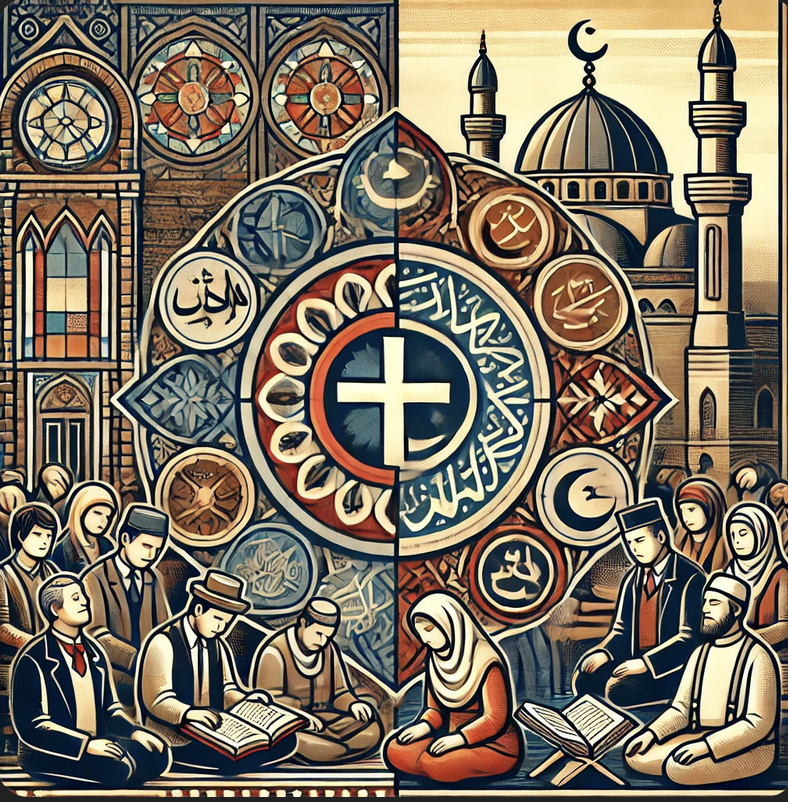

By Dr. Tim Orr
In today’s rapidly changing world, where globalization and technology continue to reshape cultural norms, many religious communities face the challenge of preserving their traditions while staying relevant. For Evangelical Christians and Muslims, tradition is more than just religious customs; it’s a core part of their identity that shapes their beliefs, practices, and everyday lives. These two groups may seem quite different, but they share a common goal: to protect their heritage amid constant change. Tradition, for them, is a way of remaining connected to their faith and ensuring future generations carry it forward. Research shows that nearly 76% of Evangelicals believe that tradition is central to their faith (Pew Research Center, 2021), while a majority of 84% of Muslims feel the same way about Islamic practices and teachings (Esposito, 2011). The drive to maintain their values and history in the face of modern challenges is essential for both groups.
Tradition as Identity: The Heartbeat of Evangelical and Muslim Beliefs
Tradition serves as a central pillar for Evangelicals and Muslims, giving them a set of rituals and a framework for understanding who they are and their purpose in the world. Evangelicals see the Bible as the ultimate guide, drawing on centuries of teachings, revivals, and community practices. Their mission is clear: to proclaim salvation through Jesus Christ. This message has been passed down from generation to generation through preaching and discipleship. 79% of Evangelicals agree that the Bible is their source of eternal truth (Noll, 2001), providing stability in a world full of change. The Bible is not just an ancient text to them but a living, breathing document that speaks to every aspect of life. This grounding gives Evangelicals a strong foundation as they engage with the challenges of today.
Similarly, for Muslims, the Qur'an, Hadith (sayings of the Prophet Muhammad), and centuries of scholarly tradition form the backbone of their faith. Tradition is embedded in daily practices like prayer, fasting, and charity. These rituals help Muslims stay connected to the early Islamic community, with 85% of practicing Muslims saying they pray five times a day as instructed by the Qur'an (Esposito, 2002). These traditions are seen as a direct link to the divine, shaping every aspect of a Muslim’s life. For them, tradition is not merely a set of religious obligations but a way of living a moral and righteous life.
In both cases, tradition is an anchor, helping believers navigate a chaotic and unpredictable world. Whether through Sunday sermons or daily prayers, Evangelicals and Muslims use tradition to stay rooted in their faith, which provides guidance and stability. Tradition also serves as a way to connect them to the broader religious community, both past and present. For these believers, tradition is much more than a relic of the past; it’s a living, dynamic force that shapes their identities.
The Role of Community: Passing Down Tradition
Evangelical and Muslim communities understand that tradition can only be preserved through collective effort. It’s within their communities that traditions are kept alive and passed down to younger generations. This communal aspect is vital, as nearly 70% of Evangelicals state that church attendance is key to their spiritual growth (Pew Research Center, 2021), while 92% of Muslims say the mosque is central to their religious life (Esposito, 2002). These spaces serve as the hub of religious life where believers can reinforce their faith and traditions.
For Evangelicals, the church is the heart of their faith community. Weekly services, Bible studies, and fellowship groups create opportunities for members to learn, grow, and practice their faith. Traditional rites such as baptism and communion tie believers to the history of the Church and reinforce their connection to the broader Christian community. The role of church leaders is critical in passing on these traditions. Pastors often emphasize the importance of maintaining a biblical worldview, even in a culture that increasingly challenges these beliefs. The community setting allows Evangelicals to hold each other accountable and stay grounded in their faith.
In Muslim communities, mosques and family play a similarly vital role. The mosque is not just a place of worship but a center for education, social life, and spiritual development. Families also take seriously the role of teaching their children about Islamic beliefs and practices. Research shows that 89% of Muslim parents see it as their duty to pass down their faith to their children, particularly through practices like prayer, fasting, and charitable giving (Esposito, 2002). During Ramadan, for instance, the communal breaking of the fast (iftar) brings families and communities together, reinforcing tradition's spiritual and social aspects. These practices bind families and communities, making tradition a lived experience rather than just a set of rules.
In both faiths, the communal aspect of tradition cannot be overstated. Tradition cannot be sustained individually; it thrives in the context of a community. Whether in a church pew or a mosque prayer hall, tradition is something shared, experienced, and celebrated together. It creates a network of support that helps believers live out their faith, providing a sense of belonging and purpose.
Tradition and Change: Balancing the Old and New
While tradition is a source of continuity, Evangelical and Muslim communities must also find ways to adapt to an ever-changing world. This balancing act between holding onto the old while embracing the new is a constant tension. How can tradition stay relevant without losing its essence? Both groups are learning to engage with modern issues while staying true to their foundational beliefs.
For Evangelicals, digital transformation has been both an opportunity and a challenge. With the rise of online church services and digital ministries, 30% of Evangelicals now say they attend services online rather than in person (Pew Research Center, 2021). This shift has sparked debates about whether digital worship can truly replicate the communal experience of a church gathering. At the same time, many Evangelical leaders are rethinking how to address societal issues like racial injustice, poverty, and mental health while maintaining a biblical framework. Churches are finding ways to meet the needs of a changing world without losing sight of the gospel message. This has led to innovative approaches in ministry that embrace social media, podcasts, and even virtual Bible studies to reach broader audiences.
Muslim communities face similar challenges in adapting to a modern, often secular world. As Islam spreads globally, with 62% of the world’s Muslims living outside the Middle East (Esposito, 2002), issues such as gender equality, globalization, and religious freedom are pressing concerns. Islamic scholars continue to debate how Sharia (Islamic law) applies to Muslims living in non-Muslim-majority countries, raising questions about the flexibility of traditional teachings in contemporary settings. Meanwhile, younger generations are finding ways to balance their faith with modernity. For example, many Muslims are using social media to share Islamic teachings, creating platforms like YouTube and Instagram to reach millions of followers worldwide. This ability to adapt shows that tradition is not static but can evolve in ways that make faith relevant to new generations.
Both Evangelicals and Muslims are finding ways to innovate while remaining grounded in their core beliefs. Tradition doesn’t mean resistance to change; it means knowing when to adapt and how to do so without losing one’s identity. This delicate balance allows both communities to thrive in today’s complex world, ensuring their faith remains relevant and deeply meaningful.
Tradition and Innovation: The Intersection of Old and New
Despite their focus on continuity, both Evangelicals and Muslims have demonstrated a remarkable ability to innovate. This innovation has allowed them to remain relevant in a rapidly changing world. For instance, Evangelicals have been pioneers in using media for outreach. From radio broadcasts to television ministries, podcasts, and social media, they have found ways to expand their message without compromising their beliefs. Today, more than 85% of Evangelical churches in the U.S. maintain an online presence, using digital tools to spread the gospel (Pew Research Center, 2021). This use of technology has allowed Evangelicals to reach global audiences, showing that tradition can be effectively communicated through new mediums.
Muslim communities have also found ways to innovate while staying true to their beliefs. Take Islamic finance, for example, which adheres to Sharia principles but engages with global markets. Similarly, environmentalism has become a key issue for many Muslim activists who use Islamic teachings about stewardship of the Earth to advocate for sustainable practices. Platforms like social media have become essential for young Muslims to express their faith in ways that resonate with modern sensibilities. For instance, the hashtag #MuslimTwitter has become a vibrant space for Muslims to share everything from daily prayers to discussions on contemporary social issues. This innovation shows that tradition and modernity can work hand in hand.
In both faiths, the interplay between tradition and innovation allows communities to stay relevant in today’s world. By blending the old with the new, Evangelicals and Muslims show that tradition is not just about the past but is a dynamic force that can engage with the present.
Conclusion: Why Tradition Matters in a Modern World
Tradition is crucial in how Evangelical and Muslim communities navigate an ever-changing world. It provides stability, a sense of identity, and continuity, helping believers stay grounded despite facing modern challenges. While deeply rooted in history, both groups have found ways to adapt and innovate, ensuring their faith remains relevant for future generations. Statistics show that tradition is not just a relic of the past—it’s a living, evolving part of their identities. For both Evangelicals and Muslims, tradition is about more than preserving the past; it’s about shaping the future.
References
Esposito, J. L. (2002). What everyone needs to know about Islam. Oxford University Press.
Noll, M. A. (2001). American evangelical Christianity: An introduction. Blackwell.
Pew Research Center. (2021). The religious landscape of Evangelicals in America. Pew Research Center.
The ideas in this article are mine, but AI assisted in writing the article.
Tim Orr is an Evangelical minister, conference speaker, and interfaith consultant with over 30 years of experience in cross-cultural ministry. He holds six degrees, including a master’s in Islamic studies from the Islamic College in London. Tim taught Religious Studies for 17 years at Indiana University Columbus and is now a Congregations and Polarization Project research associate. He has spoken at universities, including Oxford, and mosques throughout the U.K. His research focuses on American Evangelicalism, Islamic antisemitism, and Islamic feminism, and he has published widely, including three books.
 YouTube
YouTube
Sign up for Dr. Tim Orr's Blog
Dr. Tim Orr isn't just your average academic—he's a passionate advocate for interreligious dialogue, a seasoned academic, and an ordained Evangelical minister with a unique vision.
No spam. Unsubscribe anytime.
